The Entire Story of Oneida County's Illegal Zoning and 1st Amendment Abuses Against the Minocqua Brewing Company
Part 1 of 3
Hi Folks
Kirk Bangstad here, owner of the Minocqua Brewing Company.
During the week, I've started handing over our 140K email list to activists and journalists to help us all stay grounded during this massive time of political upheaval in our county, but today's email will be quite different.
I'm simply sending you a massive speech— in three parts.
I'm currently putting the final touches of my speech together to defend the Minocqua Brewing Company from yet again being forced shut down our flagship taproom by the know-nothing red hats on the Oneida County Zoning committee. I figured I should publish this speech, along with the 28 exhibits that go with it, so that the public knows the entire story of what the Town of Minocqua and Oneida County has put my company through over the last 4 years.
I'm giving this speech to the Oneida County Board of Adjustment in an attempt to appeal the county zoning department's latest attempt to shut down my business.
We'll be live-streaming the meeting at 10 am today on Facebook, so tune in to hear this speech and hopefully see us finally be exonerated.
If we lose this battle today, however, it is not over. We'll finish this in federal court, and hopefully get a restraining order in the meantime to stay open this summer.
Here's the speech. It's quite long, but so is the story of abuses.
Kirk Bangstad
Owner, Minocqua Brewing Company
Founder, Minocqua Brewing Company Super PAC
Dear Oneida County Board of Adjustment,
I come before you today to appeal of the revocation of my Conditional Use Permit (CUP) #2300385. This appeal challenges the arbitrary, unreasonable, and unconstitutional enforcement actions taken by the Oneida County Planning and Development Committee, which illegally revoked the Minocqua Brewing Company’s CUP despite substantial compliance with its conditions.
The revocation of our CUP was not based on legitimate zoning concerns but rather on selective and bad-faith enforcement designed to obstruct MBC’s lawful business operations. This appeal seeks to reverse the revocation and ensure that zoning regulations are applied fairly, consistently, and in accordance with constitutional protections. The record demonstrates that my business and I have acted in good faith to satisfy the CUP conditions, that many of the conditions imposed upon me were arbitrary and capricious, and that the County’s actions violate established legal principles governing land use and substantive due process.
Accordingly, this presentation will outline the factual background, legal framework, and constitutional violations that warrant the reinstatement of my CUP and the rejection of the Oneida County Planning and Development Committee’s unlawful and retaliatory enforcement actions.
Before I get into the details, I’d like to start by offering a brief history about the Minocqua Brewing Company under my ownership.
I’ve owned the Minocqua Brewing Company for over a decade. In our first iteration, we operated solely as a brewpub at 238 Lakeshore Drive, and we focused on serving food, brewing craft beer, and offering live music. During this period, MBC built a strong reputation for great beer, great food, and great music. We became a staple of Minocqua’s community and a highlight of the town’s social scene.
However, when COVID-19 hit in 2020, the pandemic forced businesses across the country to close their doors, and MBC was no exception. Like many hospitality businesses, the brewpub struggled under lockdown restrictions, ultimately leading to its closure. Around the same time, I became increasingly politically active, using our building to display large political signs in support of Democratic candidates. My activism gained traction, and as my visibility grew, so did my resolve to integrate politics into my business. We began selling "Biden Beer," a move that resonated with progressive supporters and further solidified MBC’s identity as a politically engaged brand. By the beginning of 2021, I had sold the Lakeshore Drive location, but my vision for MBC was just beginning to take shape.
Determined to expand MBC beyond a brewpub and into direct public engagement, I purchased the historic Texaco gas station at 329 Front Street in early 2021. My goal was to transform the dilapidated building into a taproom and community gathering space. Unlike the previous brewpub, this new location wasn’t just a place to enjoy food and craft beer, it was designed to serve as a hub for progressive activism, political engagement, and grassroots organizing. With the new taproom, I created a space where like-minded individuals could come together to discuss political issues, share ideas, and support progressive causes.
The shift from a traditional brewpub to a taproom with a strong political identity marked a turning point for MBC. What had started as a craft beer brand evolved into a symbol of resistance against right-wing extremism and political suppression in Wisconsin. This transformation, however, made my company and me targets for retaliation by local government officials and conservative activists who opposed my outspoken advocacy. The legal battles that have followed weren’t just about zoning permits, they became a fight for free speech and political expression.
Today, The Minocqua Brewing Company taproom at 329 Front Street in Minocqua operates as a progressive hub. The taproom serves MBC’s signature politically themed craft beers, wines, and sodas, including popular selections such as "Resistance Pilsner, “Snowflake Holiday Ale”, “Labor Lager”, “WOKE Coffee”, and “Choice Wine”. In addition to drinks, MBC sells merchandise that reflects its progressive values, such as T-shirts with slogans like "Trans Rights in Truck Country," "Choose Reason Over Treason," and "Drink Progressively."
The Taproom is more than just a place to enjoy craft beer, MBC has become a central gathering space for political activism in the Northwoods. The taproom regularly hosts community events and its signature beer tastings that double as political rallies. These events provide an opportunity for attendees to engage in conversations about local and national politics, the state of our great country, and organizing efforts. I frequently speak at these gatherings, using them as a platform to criticize local government officials, advocate for progressive causes, and mobilize my supporters for political action.
Beyond its political mission, MBC has become a major tourist destination, attracting tens of thousands of progressives from all across the country every summer. Supporters travel to Minocqua specifically to visit my taproom, enjoy its unique beer selections, and experience the political atmosphere firsthand.
Not only that, but I’ve put Minocqua on America’s architectural map by going through the lengthy and expensive process of having this refurbished 1930’s Texaco gas station be accepted into the National Register of Historic places--the only public building in Minocqua to have that distinction.
The influx of visitors to the Taproom, both for political and architectural reasons, significantly contributes to the local economy, bringing revenue to nearby restaurants, hotels, and other businesses. Despite this economic benefit, MBC continues to face harassment and selective enforcement by local officials intent on shutting it down.
Even in the face of these obstacles, MBC remains a thriving business and a symbol of progressive resistance in conservative Northern Wisconsin. The taproom has built a loyal customer base not just in Minocqua, but across the country, with many supporters purchasing MBC’s craft beer and merchandise online. Through social media, direct activism, and legal battles, we have established ourselves as a unique fusion of business, politics, and advocacy--standing firm against efforts to silence us.
Now that I’ve provided a little background, I’d like to outline the HISTORY OF THE ZONING DISPUTE AND SELECTIVE ENFORCEMENT OF ZONING REGULATIONS AND ORDINANCES AGAINST THE MINOCQUA BREWING COMPANY as a way to give you context to why my CUP was revoked.
The Town of Minocqua and Oneida County’s efforts to suppress my company and me date back to 2020, when I placed a large "Joe Biden for President" sign on my old building. The sign enraged local officials, prompting the Oneida County Planning and Zoning Department to threaten me with daily citations unless I removed it. See Exhibit 1, Jennrich Email RE Biden Sign.
I refused to comply, knowing that the County’s actions were unconstitutional from a 2015 US Supreme Court decision called Reed v Town of Gilbert that prohibited towns from regulating the size of political signs.
After publicly exposing the County’s efforts to silence me, the Planning and Zoning Department backed down, and my Biden sign remained. But my defiance placed a target on my back. Ever since then, Oneida County and the Town of Minocqua have systematically weaponized zoning ordinances to harass MBC and obstruct its ability to operate. The revocation of MBC’s 2024 Conditional Use Permit (CUP) is the culmination of this ongoing campaign of political retaliation.
Now I’d like get into the details of how Oneida County’s zoning process HAS BEEN USED AS A TOOL OF POLITICAL RETALIATION AND SUPPRESSION OF FREE SPEECH.
First off, the County’s efforts to silence me were premeditated. Oneida County began orchestrating its campaign to silence the Minocqua Brewing Company and me almost immediately after I purchased the building at 329 Front Street. On March 15, 2021, in response to my Facebook post announcing plans to use our new space as both a taproom and a hub for progressive activism, former Corporation Counsel Brian Desmond emailed current counsel Michael Fugel, Karl Jennrich, and Carla Blankenship to discuss amending county ordinances to prevent me from displaying political signs in the future. In his email, Desmond warned, “I am just alerting you to a problem that may be on the horizon so that you can determine what priority to give to the 9.78 re-write.” See Exhibit 2, Brian Desmond Email.
From the very beginning, Oneida County has viewed my political advocacy as a “problem” to be solved, rather than a constitutionally protected right. This email was the first step in a coordinated effort to weaponize zoning laws against me and my company, using regulatory enforcement as a tool to suppress my speech. What followed—the denial of routine parking waivers, selective enforcement of zoning conditions, and the continued targeting of my business—was not a series of isolated decisions, but rather a premeditated effort to silence my company and punish me for my progressive activism. The Board of Adjustment need only look at this early communication to see that the County’s actions against MBC were politically motivated from the outset.
Let’s now go to the beginning, when I applied for an Oneida County Administrative Review Permit to start remodeling my newly purchased but dilapidated old gas station in 2021.
As part of this process, I requested several parking space waivers, an accommodation routinely granted to other businesses in downtown Minocqua, and expected they be granted, because this property was never required to have parking since it was built in the 1930’s, and because there was a seldom-used public lot kitty corner to us. See exhibit number 3:
As you can see in Exhibit 4, This is a picture of my building taken before I bought it. The manager of this building, a bike rental shop named Z-Best Bikes, was John Camacho. As you can see in this picture, John put all his bikes in the area directly in front of his building, and wasn’t required to have parking. Our understanding is that John operated his shop in this building for approximately 30 years.
Note the space where John put his bikes is what we now refer to as the “porkchop.”
When I bought this building, I was informed by my architect, Chris Naumann, that this little piece of land that looked like a porkchop was not technically mine, but that I still had plenty of room to build a beer garden on the rest of my property. Chris suggested that I address the porkchop’s ownership with the town to ensure that I could still use that piece of land like the previous owner had done. When we asked the town who technically owned the porkchop, they responded that “since we were the developer, it was our job to figure out whose land it was.” So we did the research and told them we believed that three different entities could claim it:
We could claim it because the old owner had plowed and mowed the porkchop for over 30 years, and the concept of “Adverse Possession” states if someone has occupied and taken care of a piece of land for a long time, they have claim to it.
The Wisconsin Department of Transportation, because they created a two-lane highway about 30 years ago that created this abandoned right of way over the top of a few Minocqua Town Roads, or…
The Town, because the porkchop was built over the top of two town roads ~30 years ago.
After our presentation, the Town got back to us and claimed that they owned the porkchop with no documentation that they actually did, and they also were going to require us to build 7 parking spaces on our lot, but we couldn’t use the Town’s “newly-discovered” land for those parking spaces.
Note that this conversation took place in September of 2021, and what we didn’t know back then was that the Town of Minocqua does not have the jurisdiction to require commercial parking from businesses, because the Town is unincorporated and doesn’t have a zoning department.
But we didn’t know that at the time, and we felt completely stuck, because adding 7 parking spaces was impossible for us to structurally do. Hartzheim and his counsel had figured out a way to technically shut us down without even being able to start remodeling the building.
So we went back to Karl Jennrich and told him that, but instead of working out a solution with the zoning staff hired to figure out problems like this, we were forced to negotiate this parking impossibility in many subsequent town board meetings, which wasted precious construction time, even though the town board had no jurisdiction.
Even worse, we have emails that show Mark Hartzeim telling Karl Jennrich what he had to do in adding conditions to our Administrative Review Permit. Hartzheim, as the town chairman, had absolutely no jurisdiction to do that.
MBC finally negotiated 1 less parking spot, 6, to enable us to do business there at all. The vote was 3 to 2, with Mark Hartzheim and another member of my Facebook Hate group that we’ll get to later, Jon Thompson, voting to hold us to those 7 spots and effectively put MBC out of business.
Now let’s back up a bit….
At the September 14, 2021 Plan Commission meeting, Chairman Mark Hartzheim and the Commission not only refused to recommend the requested waivers but also openly expressed concerns that I would use the property to display left-wing political signs, as I had done at my previous location. After much discussion, the Commission conditionally approved the Administrative Review Permit recommendation but only after stripping the parking space waivers.
Following the meeting, Zoning Department employee Carla Blankenship remarked that she was surprised MBC was denied the waivers because waiver requests were typically “no big deal”. The Town had a longstanding practice of recommending parking space waivers, and I myself had previously received such exemptions when I owned and operated the Minocqua Brewing Company’s old location. In 2021, when I sold that building, the new owner applied for an Administrative Review Permit and received 43 parking space exemptions, including access to Town-owned parking. Those same accommodations were categorically denied to my new taproom on Front Street.
Beyond denying these customary waivers, the Town of Minocqua improperly inserted itself into the zoning process by drafting restrictive conditions for our permit, which Oneida County then enforced despite knowing that no other businesses in downtown Minocqua were subject to such requirements. Among these conditions was a new and unprecedented requirement that MBC enter into a revocable license agreement with the Town to use an existing driveway. No other business in Minocqua had ever been subjected to such a requirement, and the Oneida County Planning and Development Committee was fully aware of that fact. The driveway had served Z-Best Bikes for decades without issue, and nearly every other business in downtown Minocqua has a driveway that crosses Town-owned land. Despite these clear efforts to obstruct MBC’s operations, the Administrative Review Permit was ultimately issued in March 2022 but with conditions designed to create operational hurdles inserted at the request of the Town of Minocqua. Please read my Architect’s written testimony regarding his opinion that this revokable license agreement was a poison pill for my property (exhibit 5).
By March, after we started the ARP process the previous August, I had no time left to fight against the Town/County, because I had to begin construction so that we could open in the summer, or else I wouldn’t be able to afford the construction. For that reason alone, I accepted this poisonous ARP with the hopes of amending that ARP with a CUP the following winter.
The Town’s campaign against MBC did not stop with zoning restrictions. Under the leadership of Chairman Mark Hartzheim and Supervisors Susan Heil, Brian Fricke, Erika Peterson, and former Supervisor Jon Thompson, the Town escalated its retaliatory conduct. Their hostility was explicitly linked to my progressive political activism. Both Heil and Thompson were members of an over 900 person Facebook group called “We Love You Kirk,” an ironically named right-wing hate group dedicated to attacking me and my business for my progressive advocacy. This Facebook group has served as an online hub for my political opponents, where daily personal and professional attacks against me and my business have been launched.
The Town’s actions, in conjunction with this persistent political harassment, make it clear that MBC was not simply facing bureaucratic hurdles but was the target of an orchestrated effort to punish me for my political speech. Oneida County zoning officials actively assisted the Town in this mission.
This pattern of targeted enforcement was most evident when the Town unlawfully prohibited MBC from opening at 329 Front Street until every condition of the Administrative Review Permit was met, even though the Town had no authority to enforce County zoning regulations. Moreover, the Administrative Review Permit itself did not require every condition to be met prior to opening, only before its expiration. In response to the Town’s unlawful obstruction and in an effort to keep my newly formed business afloat, I leased a temporary space at 317 Front Street, a building where multiple businesses had operated for over 30 years without an Administrative Review Permit or Conditional Use Permit Unlike those businesses, however, my business was immediately cited for operating without a zoning permit. (see exhibit 6).
By March, after we started the ARP process the previous August, I had no time left to fight against the Town/County, because I had to begin construction so that we could open in the summer, or else I wouldn’t be able to afford the construction. For that reason alone, I accepted this poisonous ARP with the hopes of amending that ARP with a CUP the following winter.
The Town’s campaign against MBC did not stop with zoning restrictions. Under the leadership of Chairman Mark Hartzheim and Supervisors Susan Heil, Brian Fricke, Erika Peterson, and former Supervisor Jon Thompson, the Town escalated its retaliatory conduct. Their hostility was explicitly linked to my progressive political activism. Both Heil and Thompson were members of an over 900 person Facebook group called “We Love You Kirk,” an ironically named right-wing hate group dedicated to attacking me and my business for my progressive advocacy. This Facebook group has served as an online hub for my political opponents, where daily personal and professional attacks against me and my business have been launched.
The Town’s actions, in conjunction with this persistent political harassment, make it clear that MBC was not simply facing bureaucratic hurdles but was the target of an orchestrated effort to punish me for my political speech. Oneida County zoning officials actively assisted the Town in this mission.
This pattern of targeted enforcement was most evident when the Town unlawfully prohibited MBC from opening at 329 Front Street until every condition of the Administrative Review Permit was met, even though the Town had no authority to enforce County zoning regulations. Moreover, the Administrative Review Permit itself did not require every condition to be met prior to opening, only before its expiration. In response to the Town’s unlawful obstruction and in an effort to keep my newly formed business afloat, I leased a temporary space at 317 Front Street, a building where multiple businesses had operated for over 30 years without an Administrative Review Permit or Conditional Use Permit Unlike those businesses, however, my business was immediately cited for operating without a zoning permit. (see exhibit 6).
Oneida County was fully aware that the Town’s actions to shut us down were unlawful because it was out of their jurisdiction, yet it not only failed to intervene but actively enforced zoning restrictions that had never been applied to previous tenants of 317 Front Street. (see exhibit 7)
None of what happened was an administrative oversight. It was a calculated effort to obstruct MBC’s operations. The County’s actions forced me to incur unnecessary legal expenses, delayed the opening of the 329 Front Street taproom, and reinforced the pattern of selective enforcement and retaliation that has defined MBC’s ongoing legal battle with Oneida County zoning authorities.
Now let’s move to Conditional Use Permit Applications.
My efforts to expand MBC’s operations continued when I applied for a Conditional Use Permit in November 2022 to amend the poisonous ARP and construct a beer garden (see exhibit 8) Now that I knew that the Town of Minocqua had no jurisdiction over parking, my initial CUP application asked that all required parking be put in the “porkchop,” so that we could adhere to the Town’s wishes but also build a beer garden.
The County, which delayed the meeting to decide on this CUP until 5 months later and too late for me to pivot before the summer season, refused to waive the required parking spaces for my expansion plans, and refused to put those parking spaces in the Porkchop—citing that it was Town property and they didn’t have the jurisdiction over Town Property.
As previously stated, the County has a custom of always granting parking space waivers and between 2020 and 2023 waived 174 parking spaces in and around downtown Minocqua. Additionally, around that same time Oneida County waived 33 required parking spaces for Rocky Reef Brewing to build a beer garden, approving nearly the same request for that brewery as I was making for mine.
Please see exhibit 9 to see the 14 companies that were all given parking exemptions between 2020 and 2023, not to mention Forestry Tap and Axe, which were given parking exemptions to build an outdoor drinking area at the very same meeting where we were denied.
Please see exhibit 10 that quotes Hartzheim rationalizing why the town needed to grant the Yacht club 47 parking exemptions because they were “landlocked,” which is the exact same reason we needed parking exemptions.
By April 2023, the Oneida County Planning and Development Committee denied MBC’s CUP application, claiming that the business lacked sufficient on-site parking. This excuse was pre-textual, as MBC is located just two minutes from a large public parking lot that is rarely at full capacity. Further evidence of bias was witnessed by Former Supervisor Tony Rio, who overheard County Supervisor Scott Holewinski privately admit that the Planning and Development Committee had been intentionally delaying MBC’s CUP application to cause the business harm. The County’s motives were clear: they sought to cripple MBC financially and silence our political speech.
Despite the Oneida County Planning and Development Committee’s persistent efforts to obstruct MBC’s operations, I remained determined to move forward. In the summer of 2023, I once again attempted to amend my Conditional Use Permit (see exhibit 11) after learning that 174 parking waivers had been given to most every business that needed them.
The zoning department delayed taking up my CUP for two months, which put us into late June. Because we were in the heart of the tourism season and I wasn’t allowed to build a beer garden, I put tables out on my concrete stoop, which was “on premise,” and my state issued Brewery permit allowed me to serve beer “on premise.”
Rather than treating MBC fairly and applying zoning laws consistently, the Planning and Development Committee, chaired by Scott Holewinski, continued its campaign of selective enforcement. They not only refused to grant me the parking space waivers that would allow me to build a sizeable beer garden, but they started giving me daily citations for serving beer to my customers on my concrete stoop—which was happening everywhere on the island and even across the street from us at the Bottled Bean, and would have been permitted if they had granted by CUP in a timely fashion.
Despite these clear efforts to sabotage MBC, Oneida County was ultimately forced to approve MBC’s second CUP application in October 2023, which was amended greatly from our initial application and meant to save face for the Town and County.
See exhibit 13 to appreciate how much more difficult the agreed upon parking spaces were as compared to putting them in the porkchop, which made the most sense.
This approval did not come as an act of fairness or a recognition of my legal rights. Instead, the County only relented because it was facing an ongoing federal lawsuit from me, which alleged that the County’s actions constituted unconstitutional retaliation and selective enforcement. Rather than defending its unlawful conduct in federal court, the County begrudgingly approved the CUP, but not without attaching a series of arbitrary conditions designed to leave MBC vulnerable to future enforcement actions.
These conditions were not genuine regulatory measures but rather a calculated strategy to keep MBC in a precarious position. By crafting vague, unnecessary, and highly restrictive permit conditions, the County ensured that it retained the ability to justify future enforcement actions against MBC at any time. This was not an approval in good faith; it was a conditional reprieve, issued under legal pressure, with the clear intention of setting up future obstacles. The County’s actions following the CUP approval made it evident that this was merely a temporary concession, as enforcement actions against MBC resumed almost immediately.
Rather than allowing me to operate my business in peace, the County continued to use its zoning authority as a weapon, ensuring that MBC remained entangled in legal battles and bureaucratic red tape. This was not about zoning compliance—it was a coordinated effort to punish me for my political views and to make it as difficult as possible for MBC to exist in Minocqua.
Before I move onto what happened over 2024 that resulted in Oneida Zoning once again revoking my CUP, I want to spend some time talking about “selective enforcement.”
The County’s pattern of selective enforcement is undeniable. While other businesses engaged in similar conduct without issue, MBC became the sole target of aggressive zoning enforcement.
First, I want to remind you of the UNEQUAL PARKING SPACE WAIVERS
Between 2020 and 2023, Oneida County granted 174 parking space waivers to businesses in downtown Minocqua. MBC, however, was repeatedly denied waivers—despite the fact that the business was similarly situated, and that ample public parking was available nearby.
Next, I want to talk about UNEQUAL DUMPSTER ENFORCEMENT
In summer 2023, the County took a hardline stance against MBC for having an unscreened dumpster, issuing citations and using the violation as a basis for revoking MBC’s permits. Meanwhile, at least 30 other businesses in downtown Minocqua also had unscreened dumpsters, yet no enforcement action was taken against them. In fact, three businesses with unscreened dumpsters visible from MBC’s parking lot were ignored until I publicly exposed the double standard.
See exhibit 14:
Next, I want to talk about UNEQUAL OUTDOOR DISPLAY ENFORCEMENT
MBC was cited for displaying T-shirts and merchandise outside its front door—an alleged violation of its zoning permit. Yet several neighboring businesses had outdoor displays that violated county ordinances, and none faced similar enforcement. See exhibit 15:
In August 2023, after public scrutiny, Oneida County officials identified 12 other businesses violating zoning ordinances through outdoor displays, yet no meaningful action was taken against them. To this day, businesses such as Island City Square, J. Christy’s, Oakfire Properties, Natural Northern, and Hooked and Tagged continue violating zoning rules without consequence.
And, due to limits on articles…. please see part 2 for more….







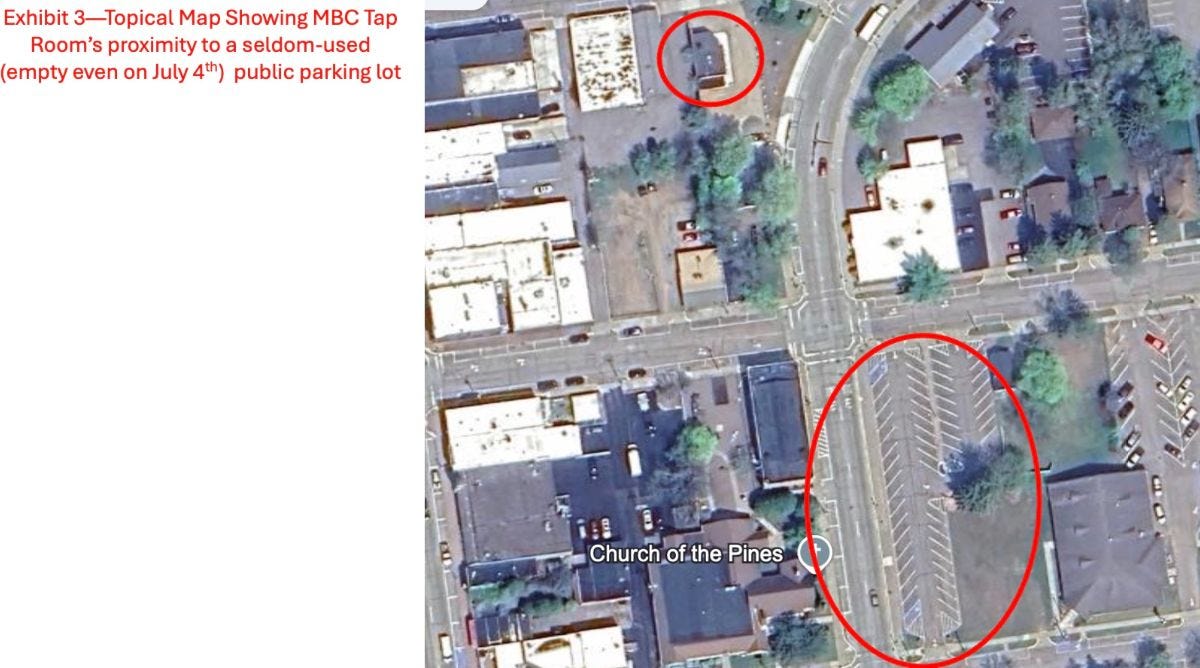
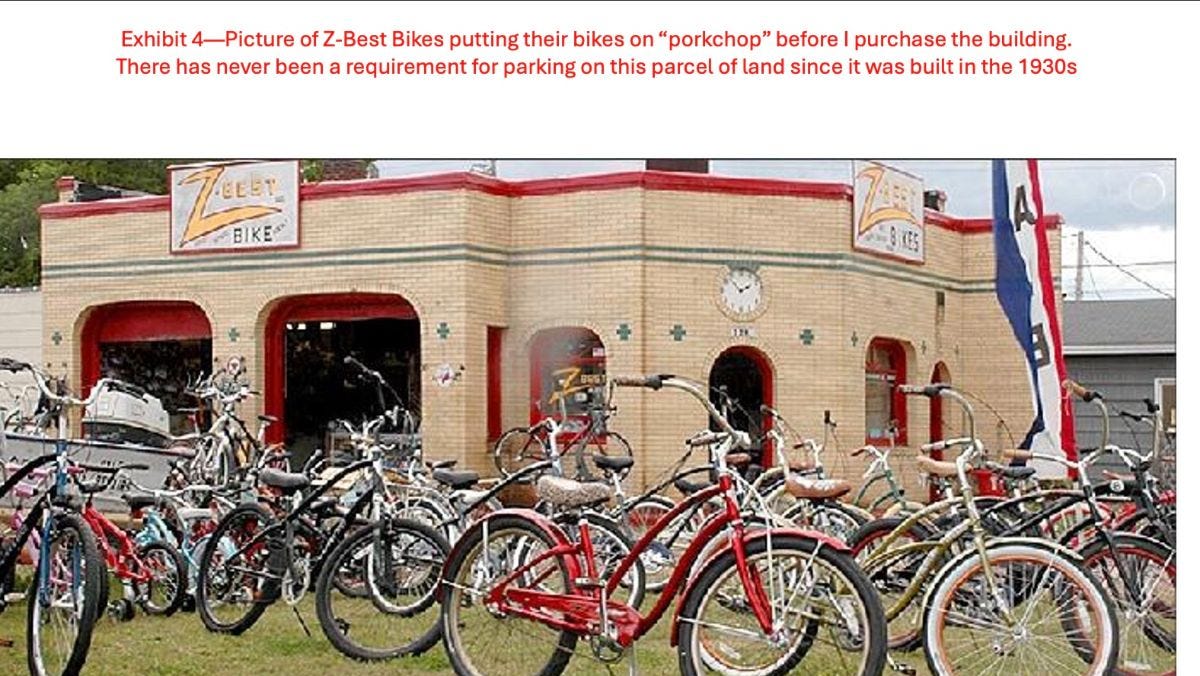
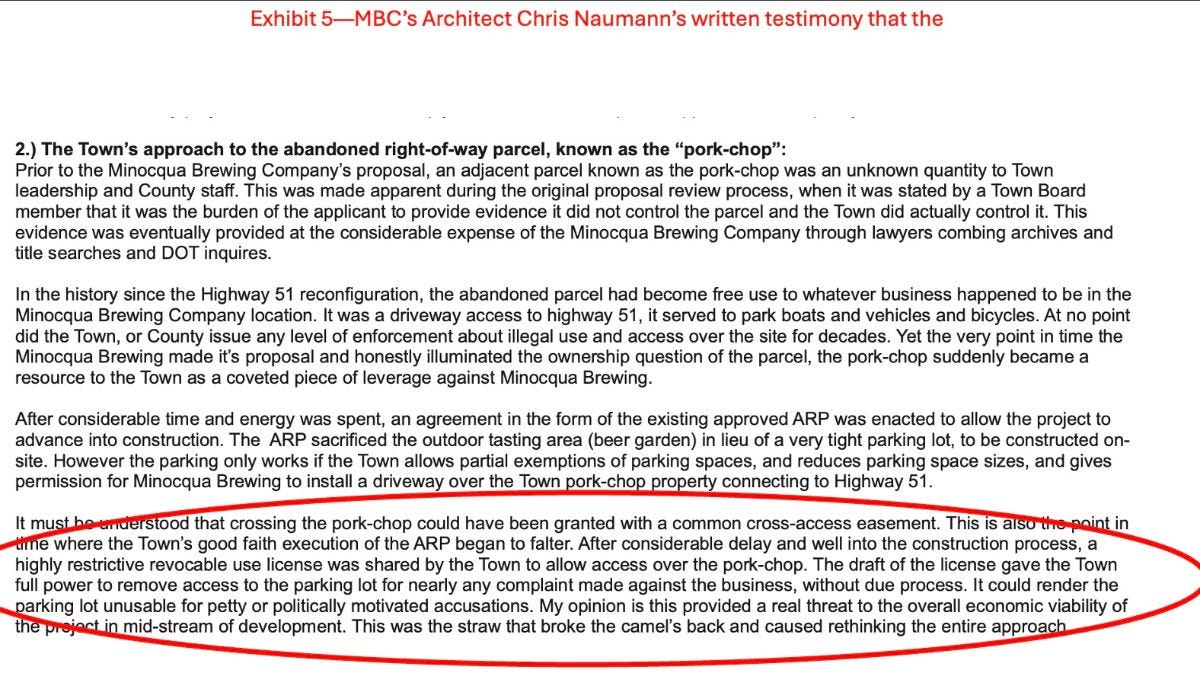

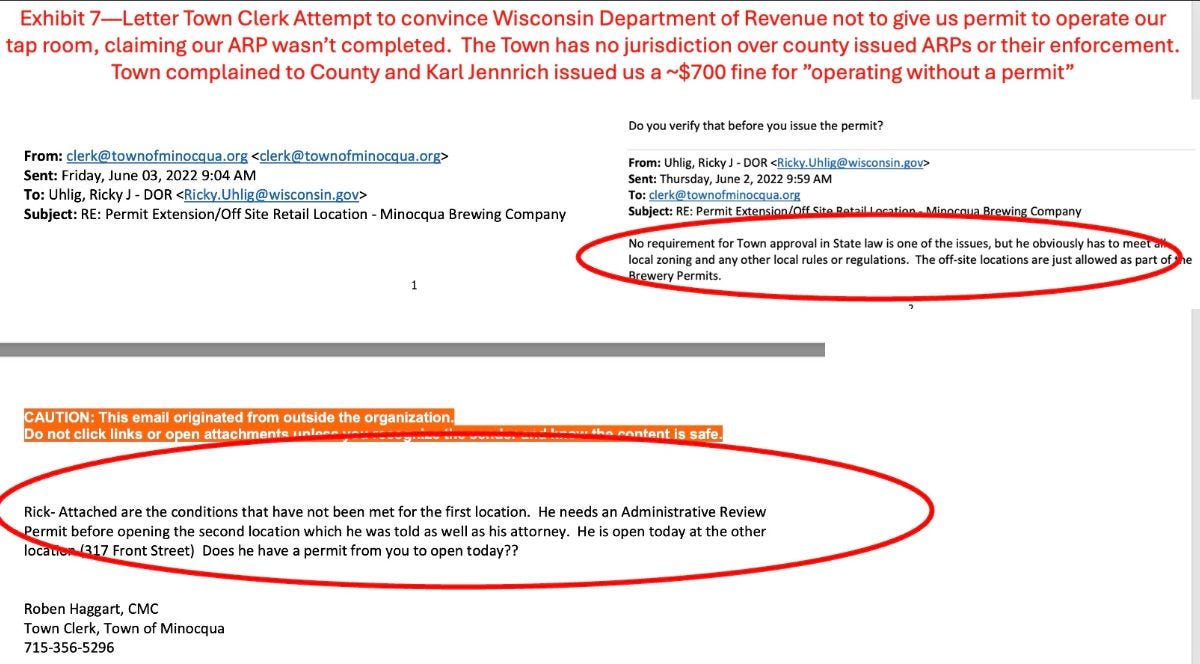

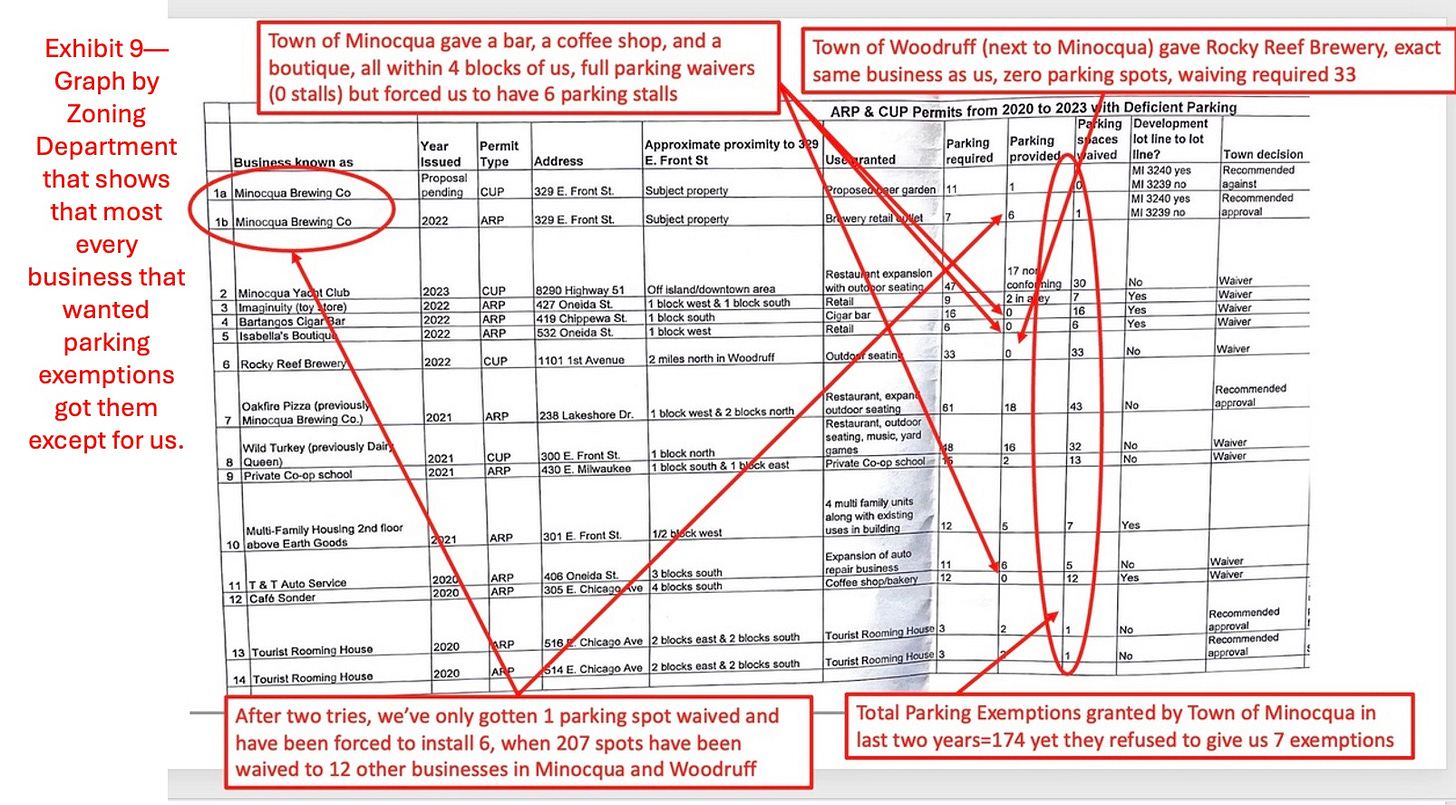
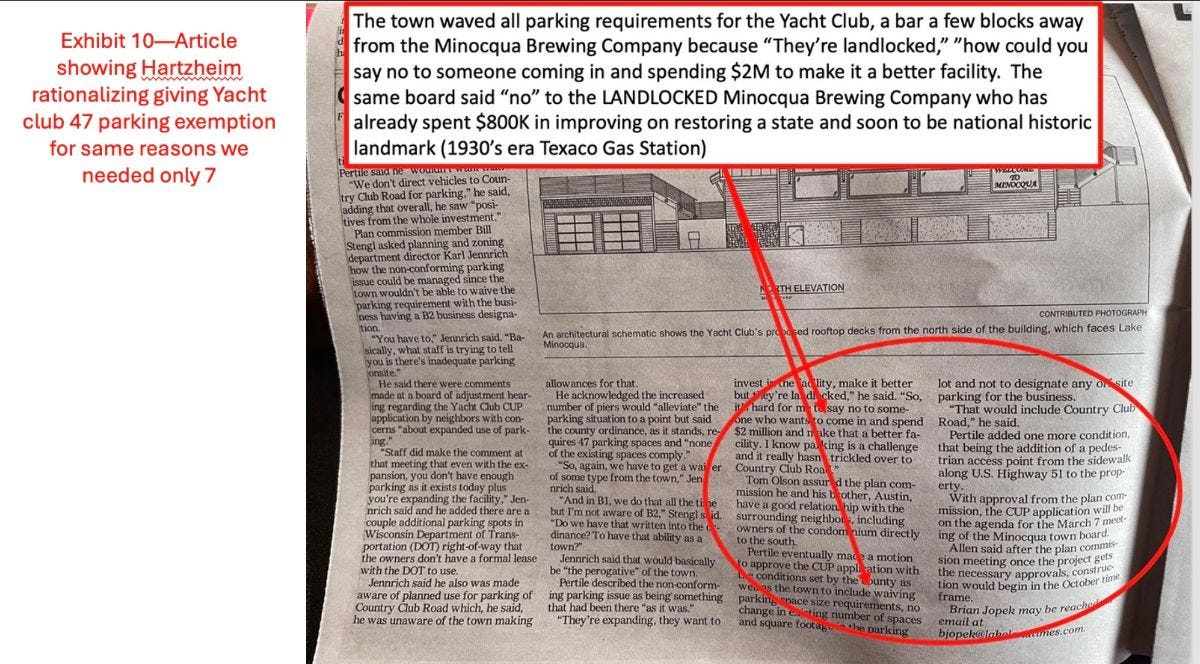


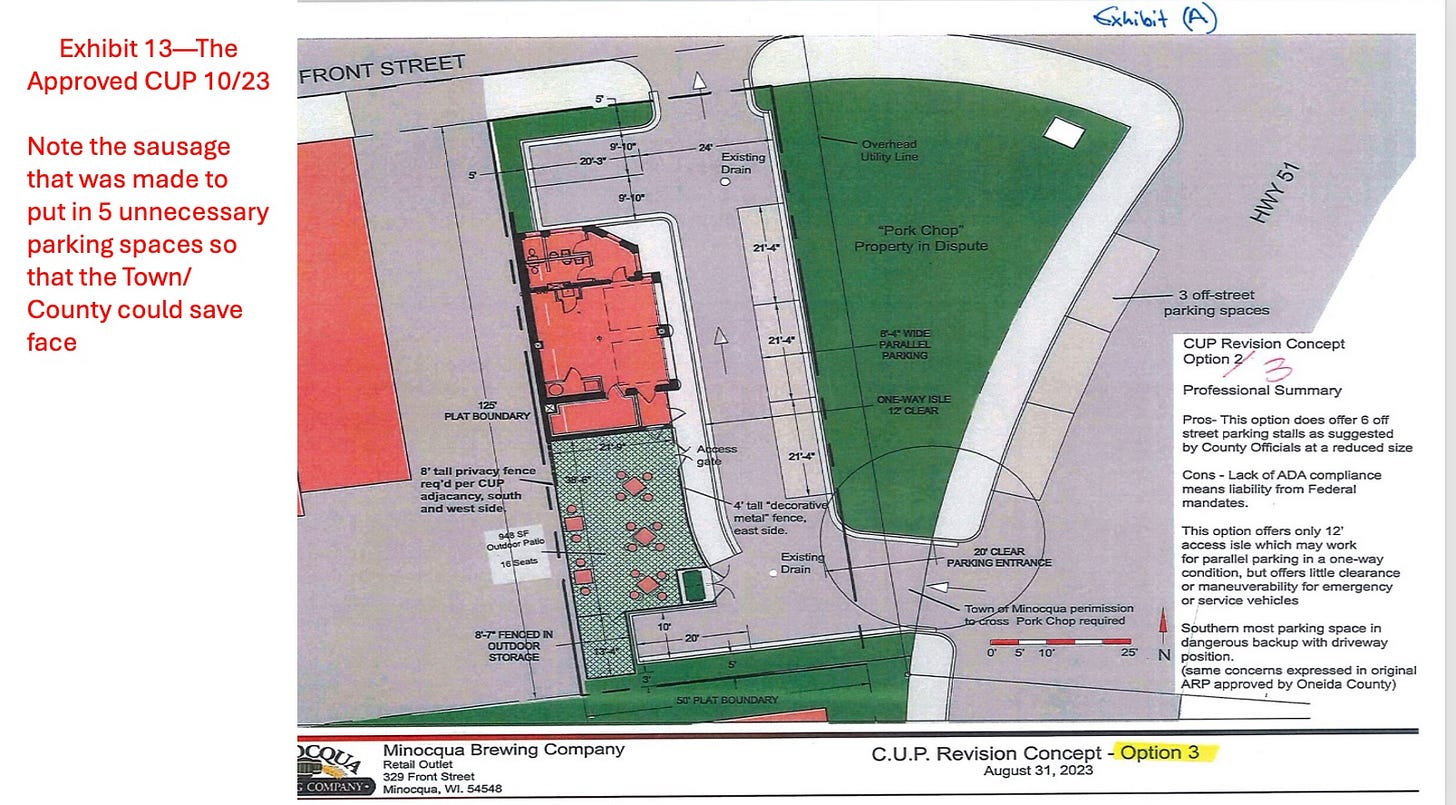
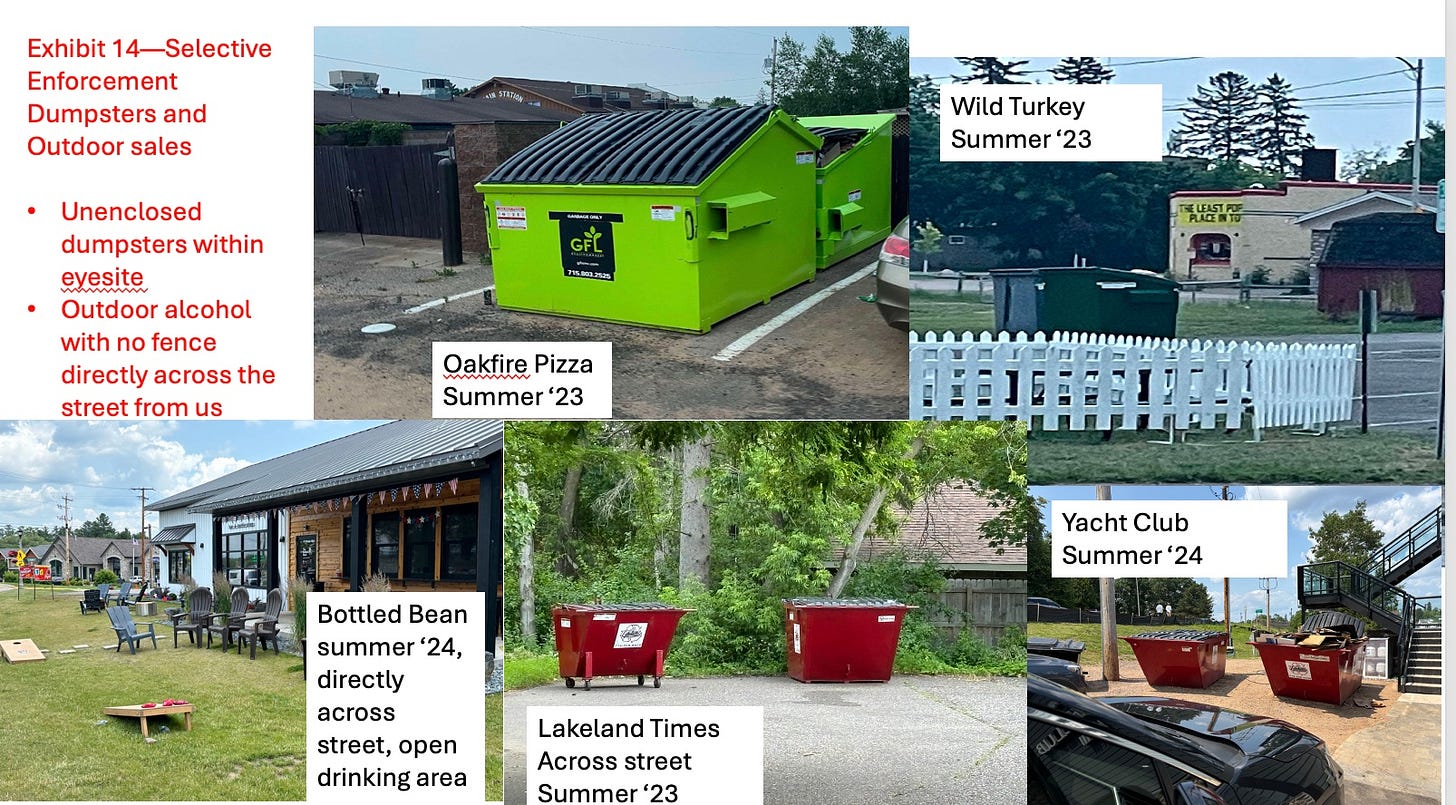
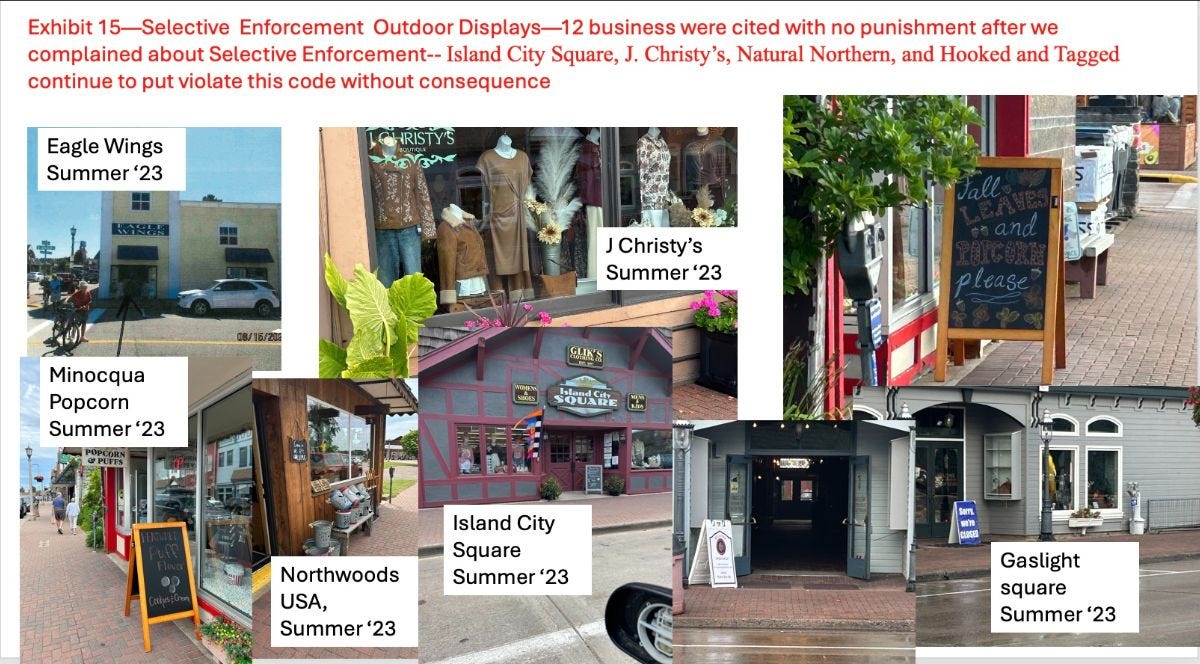
Rooting for you here in Arizona!